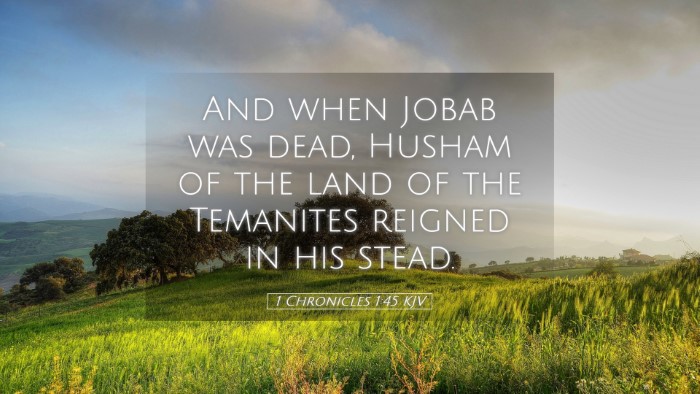Commentary on 1 Chronicles 1:45
Verse Text: "The sons of the servants of Solomon: the sons of Sotai, the sons of Sophereth, the sons of Peruda."
Overview
This passage belongs to the genealogical records found in the first chapters of 1 Chronicles, where the lineage of Israel is meticulously documented. The objective of these genealogies is to affirm the identity and heritage of God's chosen people. The verse places particular emphasis on the lineage of servants of Solomon, showing how the heritage of service to the king and the temple was preserved.
Commentary Insights
1. Historical Context
Albert Barnes reflects on the broader historical context in which these genealogies were recorded, noting that after the Babylonian exile, there was a desire to re-establish Israel’s identity and continuity. The priests and Levites, along with the descendants of Solomon’s servants, were reestablished in their roles and duties pertinent to the worship and service of Yahweh.
2. The Servants of Solomon
The phrase "sons of the servants of Solomon" denotes loyalty and the continuity of service. Matthew Henry emphasizes the significance of servitude in the biblical narrative: it is a high calling to serve God and others. Through their genealogy, these individuals' dedication and service are acknowledged; it conveys the theological concept that servitude to God is honorable and carries its own legacy.
- Sotai: Likely derived from a Hebrew root meaning "to be concealed"; perhaps signifying those who served covertly, providing their support in silent diligence.
- Sophereth: This name suggests a connection to literary tasks, possibly indicating those who administered or recorded important legal and religious documents during the reign.
- Peruda: Reflects a character who was freed or set apart, symbolizing the call to freedom within the servitude to a greater cause—serving God in the temple.
3. Theological Significance
Adam Clarke notes the profound implications of this short verse. The mention of Solomon’s servants is not trivial; it reflects God’s sovereignty in orchestrating the survival of the faithful remnant. In the genealogical listings, one sees God’s hand preserving not only the Jews but also those associated with the temple worship—a theme that runs throughout the Old Testament.
The inclusion of these names suggests the importance of recognizing and valuing every believer’s contribution to the wider community of faith. Every lineage had its significance, contributing to the larger narrative of God’s redemptive plan. This can inspire believers, pastors, and theologians to acknowledge the often-overlooked members of the faith community and their essential roles.
4. Lessons for Today
From this passage, several lessons arise:
- Legacy of Service: Just as the lineage of Solomon’s servants was marked by loyalty and duty, modern believers are called to serve faithfully within their communities of faith.
- Community Identity: The genealogies serve as a reminder of the vital importance of community within the faith. Every member, known or unknown, plays a part in God's story.
- God's Sovereignty: Each name in the genealogy illustrates God’s providence and faithfulness over generations. This reflects a continuous divine narrative where God uses individuals within their cultural contexts to unfold His purpose.
Conclusion
In examining 1 Chronicles 1:45, we uncover a rich tapestry of history, identity, service, and divine purpose. While this single verse may appear simple, it underlines important truths relevant to the faith community today. The brief mention of Solomon's servants illustrates God's enduring legacy of those who serve faithfully, encouraging current generations to embrace their role in God’s unfolding story. Our understanding of this verse, therefore, is part of a larger call to recognize, honor, and continue the work that builds up the church and witnesses to God's kingdom.


